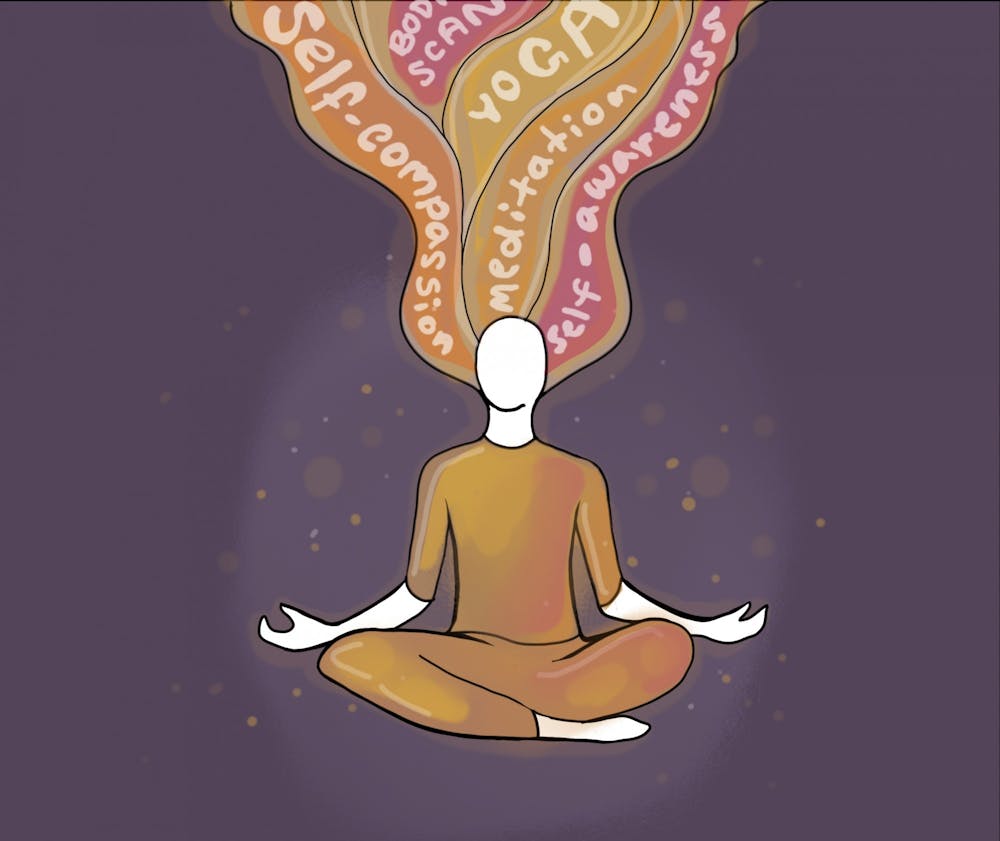University experts explain the positive effects of mindfulness on the mind and body and the ways in which students can practice mindfulness, which is the practice of strengthening one’s skills in being more “awake” and conscious of each moment as it happens, per the U.Va. Mindfulness Center.
Assoc. Internal Medicine Prof. Matthew Goodman said mindfulness involves the act of non-judgmentally acknowledging these moments as they pass. Goodman said accepting personal imperfections is not necessarily an easy task, yet daily mindfulness practices — such as meditation or deep breathing exercises — can foster self-compassion.
When not practicing mindfulness, people can find themselves in “default” mode, wherein they use first-person narrative thinking and consider what they’ll be doing in the near future as opposed to the present, Goodman said.
“One thought follows another follows another can contribute to or perpetuate depressive and anxiety states,” Goodman said.
Studies analyzing the relationship between mindfulness exercises and improved mental health have found that undergraduate students experienced reductions in their psychological symptoms after participating in an eight-week-long, mindfulness-based stress reduction program. MBSR programs are designed to teach people — in this case, students — about practical ways they can incorporate mindfulness into their everyday lives.
Goodman and Dr. John Schorling, instructor at the Mindfulness Center, conducted a research study that examined the effectiveness of eight-week mindfulness programs with a seven-hour retreat on burnout and the mental well-being of health care providers. The study found that these programs effectively reduced burnout symptoms — including emotional exhaustion — in physicians and other health care workers.
Goodman conducted another study with U.Va. Health and School of Medicine colleagues that investigated how mindfulness practices compared to massages helped patients with chronic pain.
“What we found was that both helped people with chronic pain, but the mindfulness intervention was more durable,” Goodman said. “It didn't necessarily decrease pain levels, but it decreased the suffering around pain … the massage treated the physical pain, but the mindfulness treated … the psychological part of pain.”
Other studies show a correlation between patients practicing mindfulness and measurable improvements in physical well-being.
One study found a correlation between MBSR program participation and altered cortisol levels, which led to reduced stress levels in addition to decreased blood pressure — cortisol is the body’s primary stress hormone which suppresses nonessential functions in fight-or-flight situations. In terms of the external effects of mindfulness, patients with psoriasis — an immune-mediated disease that causes the buildup of skin cells — experienced significantly greater improvements in skin condition when combining traditional treatments with MBSR, per a clinical trial from the National Institute of Health.
Additional experiments found that mindfulness practices led to lower reductions in T-cell counts in HIV-infected individuals, improving immunity. Similarly, in individuals vaccinated for influenza, antibody levels — and thus, immunity against influenza — were higher among those who practiced meditation.
Assoc. Nursing Prof. Sam Green teaches a mindfulness course at University for students and leads a meditation group for members of the Charlottesville community. A few of the mindfulness practices Green recommended include yoga, sitting meditation, walking meditation, mindfulness in everyday life and performing a body scan — giving each part of the body attention in a gradual, meditative sequence.
One of the benefits of mindfulness Green said he has noticed in his students is improved concentration while studying, because the element of worrying — which distracted students while studying — was reduced or removed.
“They get their work done faster, and they get it done better because they're paying full attention to it,” Green said.
First-year College student Ashley Zhang began meditating earlier this year and said she finds journaling and other active mindfulness practices helpful.
“I also find walking around very therapeutic … you can get some fresh air, look at nature,” Zhang said.
Additionally, Zhang said she experiences less stress and anxiety when practicing mindfulness.
It is also important to remember that mindfulness is a “package deal” with other activities recommended by health care professionals, such as sleep and exercise, Goodman said. Completing one of those activities will not necessarily be beneficial if other essential activities are neglected.
For students looking to begin incorporating meditation into their daily routines, Green recommended beginning with a course and combining meditation with active mindfulness, such as walking or yoga.
“There's no substitute for doing the practice [of active mindfulness],” Green said.
The University offers many opportunities for students to practice mindfulness — including at the Mindfulness Center, Contemplative Sciences Center, U.Va. Nursing’s Compassionate Care Initiative and the Student Health and Wellness Center. Student groups — including Mind&Body, UYoga and Active Minds — also provide an opportunity for students to practice mindfulness in a community setting among their peers.







